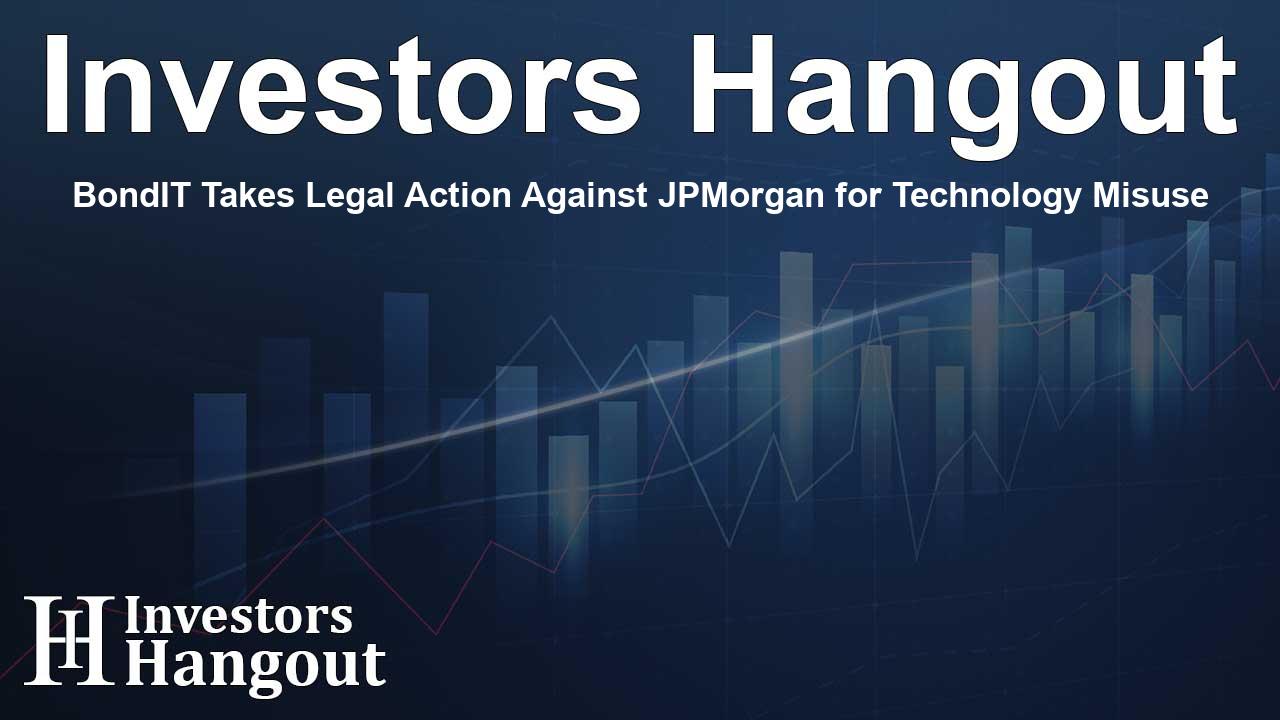BondIT Takes Legal Action Against JPMorgan for Technology Misuse

BondIT Files Lawsuit Against JPMorgan for Alleged Misconduct
In an intriguing turn of events, BondIT, a prominent player in the fintech space, has initiated legal proceedings against JPMorgan Chase Bank. The lawsuit centers around allegations of breach of contract, misappropriation of technology, and unfair dealings, raising significant questions about the dynamics between large corporations and innovative startups.
The Allegations Against JPMorgan
The complaint was filed in the Commercial Division of the New York Supreme Court. It claims that JPMorgan, despite an extensive partnership negotiation process, unlawfully abandoned a critical strategic partnership with BondIT. This partnership was characterized by binding agreements, assurances of an equity investment, and collaborative efforts that lasted for nearly two years.
JPMorgan selected BondIT through a competitive bidding process and was thrilled by the possibilities the partnership could offer. BondIT's cutting-edge fixed income technology was integrated meticulously into JPMorgan’s systems during this period of collaboration, with senior bank executives expressing satisfaction with the work done. However, contrary to all expectations, the bank terminated negotiations abruptly, citing pretextual reasons that left BondIT both surprised and frustrated.
Impact of the Allegations on Innovation
These allegations highlight a troubling trend in the business world, where smaller companies are often subject to the whims of larger corporations. BondIT claims that JPMorgan's actions exemplify the unfair treatment that smaller, innovative firms can face in the market. CEO Etai Ravid voiced concerns over the implications of such conduct, stating that it could potentially stifle innovation within the fintech ecosystem. "When companies use their leverage to exploit smaller firms, it creates an environment where ingenuity is threatened," he stated.
He continued, citing that no company should be able to utilize the resources of another without fair compensation. Ravid emphasized the need for accountability, asserting that if companies like JPMorgan are allowed to escape without consequence, it would chill innovation across the industry.
The Financial Stakes
Abandoning the partnership, particularly at a time when projections indicated that the collaboration could generate around $100 million annually for JPMorgan, raises questions about the motivations behind the bank’s decision. As negotiations were drawing to a close, the abrupt halt left BondIT in a vulnerable position, having invested significant time and resources into developing technology tailored for JPMorgan.
Moreover, the lawsuit asserts that BondIT’s proprietary technology and trade secrets were misappropriated by JPMorgan for its own internal use, transforming this case into a broader issue of intellectual property theft and trust violations.
Looking Ahead
As BondIT seeks damages in the lawsuit, the outcome will likely hinge on the evidence presented regarding the alleged misconduct of JPMorgan. Legal experts predict that this case could set a precedent for how large financial institutions engage with tech startups, balancing their need for innovation against ethical business practices.
BondIT’s representation, the law firm Quinn Emanuel Urquhart & Sullivan, LLP, will be instrumental in navigating the complexities of this high-profile case. The fintech company aims to not only seek recompense but also protect its technological innovations from further exploitation.
About BondIT Global
BondIT stands out as a fintech pioneer dedicated to enhancing the investment landscape for financial institutions. By developing advanced technology that assists in portfolio monitoring, investment analysis, and compliance, BondIT is reshaping how organizations approach financial challenges. Operating from multiple offices around the globe, the firm employs explainable AI to provide portfolio managers and financial institutions with crucial insights, efficiency, and transparency in their operations.
Frequently Asked Questions
What prompted BondIT to sue JPMorgan?
BondIT claims that JPMorgan unlawfully abandoned a strategic partnership and misappropriated their proprietary technology after two years of negotiations.
What are the key allegations against JPMorgan?
JPMorgan is accused of breaching contracts, misappropriating technology, and acting in bad faith throughout the partnership negotiation process.
What damages is BondIT seeking?
BondIT is pursuing damages to be determined at trial, along with injunctions to prevent JPMorgan from using their technology.
How does this lawsuit impact the fintech industry?
The case underscores the challenges smaller firms face when dealing with larger corporations and how such dynamics can stifle innovation in the fintech ecosystem.
Who is representing BondIT in this lawsuit?
BondIT is being represented by the law firm Quinn Emanuel Urquhart & Sullivan, LLP, known for handling complex commercial litigation.
About The Author
Contact Dylan Bailey privately here. Or send an email with ATTN: Dylan Bailey as the subject to contact@investorshangout.com.
About Investors Hangout
Investors Hangout is a leading online stock forum for financial discussion and learning, offering a wide range of free tools and resources. It draws in traders of all levels, who exchange market knowledge, investigate trading tactics, and keep an eye on industry developments in real time. Featuring financial articles, stock message boards, quotes, charts, company profiles, and live news updates. Through cooperative learning and a wealth of informational resources, it helps users from novices creating their first portfolios to experts honing their techniques. Join Investors Hangout today: https://investorshangout.com/
The content of this article is based on factual, publicly available information and does not represent legal, financial, or investment advice. Investors Hangout does not offer financial advice, and the author is not a licensed financial advisor. Consult a qualified advisor before making any financial or investment decisions based on this article. This article should not be considered advice to purchase, sell, or hold any securities or other investments. If any of the material provided here is inaccurate, please contact us for corrections.
